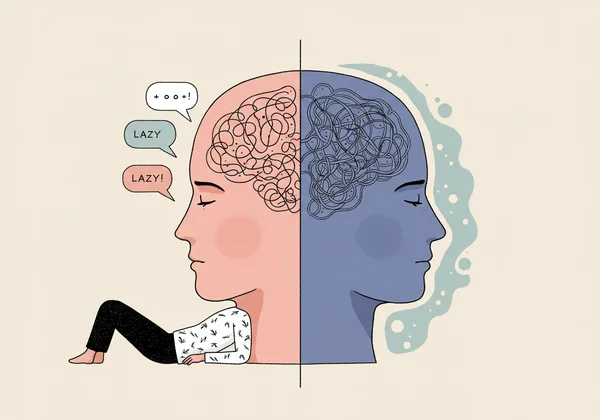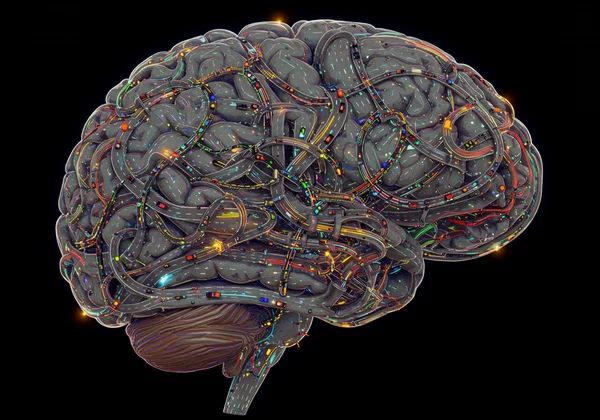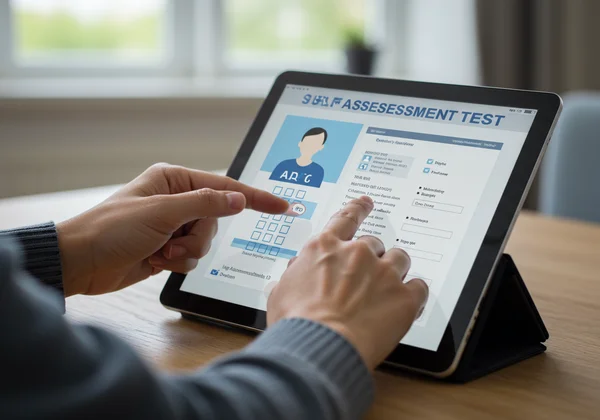ASRS Test: Explore Adult ADHD - Understanding Laziness & Inattention Challenges
July 21, 2025 | By Miles Harrison
Are you constantly battling procrastination, disorganization, or a nagging feeling of being 'lazy,' even when you genuinely want to be productive? Many adults grapple with these challenges, often wondering if their struggles with inattention and motivation are a character flaw or something more. This internal debate of ADHD vs. laziness can be exhausting and demoralizing. But what if the answer isn't about willpower? Do I have ADHD or am I just lazy? This is a question that deserves a thoughtful, compassionate exploration.

This article will help you understand the crucial differences between situational motivation slumps and the persistent patterns that may indicate Adult ADHD. We'll move beyond labels and self-blame to uncover the underlying mechanics of focus and action. For those seeking initial clarity, a structured tool can offer a valuable first step. You can always get a first impression with a confidential self-screening tool designed to explore these very symptoms.
Unpacking "Laziness": What Does It Really Mean?
The word "lazy" is heavy with judgment. It implies a conscious choice to avoid effort. However, for many, the inability to start or complete tasks isn't a choice at all. It’s a frustrating and often painful experience. Before jumping to conclusions, it's essential to reframe what we perceive as laziness and look at the mechanisms behind it.
Understanding Common Motivation & Procrastination Cycles
Everyone procrastinates sometimes. We might put off a task because it’s boring, difficult, or overwhelming. This is a normal part of the human experience. A typical procrastination cycle involves delaying a task, feeling a bit of guilt, and then eventually completing it, perhaps under pressure from a deadline. Motivation naturally ebbs and flows depending on our mood, energy levels, and interest in the task at hand. However, these cycles are usually temporary and don't consistently disrupt all areas of life.
When Inactivity Is Not a Moral Failing
Persistent inactivity, especially when it goes against your own goals and desires, is rarely a moral failing. It is often a symptom, a signal that something else is going on under the surface. This could be burnout, stress, or an underlying neurodevelopmental condition. Viewing your struggles through a lens of curiosity rather than criticism is the first step toward understanding. When the "engine" won't start no matter how much you want it to, it's time to check what's happening under the hood instead of blaming the driver.

Adult ADHD Symptoms: Beyond Just Inattention
When people think of ADHD, they often picture a hyperactive child. In adults, however, the symptoms manifest differently and are far more nuanced than simple distractibility. The core challenge often lies in the brain's management system, which impacts nearly every aspect of daily life. An adult adhd self-assessment can help map these diverse symptoms.
Executive Dysfunction: The Hidden Core of Adult ADHD
This is the key differentiator. Executive functions are a set of mental skills that include working memory, flexible thinking, and self-control. They are the skills we use to plan, organize, initiate tasks, and manage our time. For adults with ADHD, executive dysfunction means there is a chronic disconnect between intention and action. You might know exactly what you need to do and how to do it, but activating the part of your brain to actually start can feel impossible. This isn't laziness; it's a neurological traffic jam.

Emotional Dysregulation and Hyperfocus in Adults
ADHD isn't just about focus—it's also about regulating emotions. Many adults with ADHD experience intense emotional responses, quick frustration, and difficulty calming down. This emotional component is often overlooked. On the flip side, there's hyperfocus: the ability to become so absorbed in an interesting task that you lose all track of time and your surroundings. While it sounds like a superpower, it can also lead to neglecting important responsibilities, demonstrating that the issue is one of inconsistent attention regulation, not a total lack of it.
Consistency vs. Choice: A Key Distinction
A person struggling with laziness might choose to watch TV instead of doing chores. A person with ADHD might desperately want to do the chores, sit on the couch surrounded by cleaning supplies, and feel mentally paralyzed, unable to begin. The critical distinction lies here: one is a preference-based choice, while the other is a neurologically-based inability to perform consistently. This struggle with consistency across various life domains is a hallmark of ADHD.

What Feels Like ADHD But Isn't? Differentiating Similar Conditions
It's crucial to recognize that many conditions can present symptoms that look like ADHD. Understanding these overlaps is important for gaining true clarity. If you're unsure, an online ADHD screening provides a structured way to see if your symptoms align with those commonly associated with ADHD before speaking with a professional.
Overlapping Symptoms: Anxiety, Depression, and Burnout
Anxiety can make it hard to concentrate because your mind is preoccupied with worry. Depression can sap your motivation and energy, making it difficult to initiate tasks. Burnout from chronic stress can lead to mental exhaustion, forgetfulness, and a feeling of being completely overwhelmed. All of these can mimic the inattention and executive challenges of ADHD, and they can also exist alongside it, making the picture even more complex.
The Impact of Sleep Disorders and Chronic Stress
Never underestimate the power of sleep. A lack of quality sleep can devastate your ability to focus, manage emotions, and remember things. Similarly, living in a state of chronic stress keeps your body in "fight or flight" mode, which diverts resources away from higher-level brain functions like planning and organization. Before assuming ADHD, it's vital to consider if these external factors are the primary cause of your symptoms.
Considering ADHD: How to Self-Assess & Next Steps
If you've read this far and feel a deep sense of recognition, you might be wondering what to do next. The journey to understanding yourself begins with gentle self-reflection and gathering information in a structured way. This process is not about self-diagnosis but about self-awareness.
Reflecting on Your Patterns and Personal History
Think back beyond this week or month. Have these struggles been a consistent theme throughout your life? Did you have trouble in school with organization or deadlines, even if your grades were good? Do friends or family describe you as "scattered" or "in your own world"? ADHD is a lifelong condition, so examining your personal history for consistent patterns is a key part of the puzzle. It helps you explore your patterns in a more objective light.
The Role of an ASRS Test for Initial Screening
For a more structured approach, the Adult ADHD Self-Report Scale (ASRS) is an invaluable tool. Developed in partnership with the World Health Organization (WHO), the ASRS is a questionnaire designed to screen for symptoms of adult ADHD. It's a confidential and scientifically validated starting point. Taking a test like this can translate your vague feelings of struggle into concrete data, providing a clearer picture of your experience. It's an excellent, low-pressure way to take a confidential screening and gather information you can later discuss with a healthcare provider if you choose.

Moving Beyond Self-Blame: Your Path to Clarity
The debate between "ADHD or laziness" is often a false one. What feels like a moral failing is frequently a sign of a neurological difference or another underlying issue that deserves compassion and support. Understanding this distinction is the first step toward letting go of guilt and finding effective strategies.
Your struggles are valid. If what you've read resonates with you, your next step can be one of empowered discovery. Taking a free, confidential ASRS test is a simple way to gain a preliminary understanding of your symptoms. Our platform provides an instant summary and a unique, AI-powered personalized report that goes beyond a simple score. It's time to trade self-criticism for clarity. Get your AI-powered insights today and start your journey toward understanding.
Frequently Asked Questions About Adult ADHD & Self-Screening
How accurate is the ASRS ADHD test? The ASRS v1.1 is a highly reliable screening tool developed with the World Health Organization (WHO) to identify adults who may have ADHD. While it is not a diagnostic tool, it is very accurate for initial screening purposes and is widely used by clinicians.
What are common signs of adult ADHD? Common signs include chronic procrastination, difficulty organizing tasks, forgetfulness in daily activities, poor time management, impulsivity (e.g., in spending or decisions), emotional dysregulation, and a persistent feeling of being overwhelmed or unable to reach your potential.
How can I tell if my struggles are ADHD or just lack of motivation? A key difference is consistency and impact. Lack of motivation is often task-specific or temporary. ADHD involves a chronic, lifelong pattern of challenges with executive functions that affects multiple areas of life (work, home, relationships), despite a genuine desire to succeed. A validated screener can help you see if your symptoms align with a clinical pattern. Why not try the ASRS test to see?
Is it worth seeking a professional ADHD diagnosis? For many, yes. A formal diagnosis can provide validation, access to effective treatments (like therapy and/or medication), and workplace accommodations. It can fundamentally change your self-perception, replacing years of self-blame with understanding and effective strategies, ultimately helping you thrive.